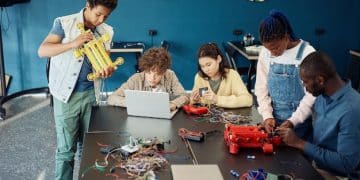National Education Standards Revision: What’s Changing for Students in Fall 2025?

National Education Standards Revision: Key Changes and What They Mean for Students Starting Fall 2025 involves a comprehensive overhaul of educational benchmarks, impacting curriculum, instruction methods, and assessment strategies to better prepare students for future challenges and opportunities.
The educational landscape in the US is about to undergo a significant transformation. The National Education Standards Revision: Key Changes and What They Mean for Students Starting Fall 2025 are set to roll out, promising a renewed focus on preparing students for the demands of the 21st century.
Understanding the National Education Standards Revision
The national education standards serve as a framework for what students should know and be able to do at each grade level. These standards guide curriculum development, instructional practices, and assessment methods across the country. The upcoming revision aims to address evolving educational needs and ensure students are equipped with the skills and knowledge necessary for future success.
The revision process has been extensive, involving educators, policymakers, and stakeholders from across the nation. Their collective expertise has shaped the updated standards, reflecting current research and best practices in education. The goal is to create a more relevant and effective educational experience for all students.
Goals of the Revision
The primary goals of the revision encompass several key areas, each designed to enhance the quality and relevance of education.
- Ensuring students are college and career-ready upon graduation.
- Promoting critical thinking, problem-solving, and creativity.
- Integrating technology effectively into teaching and learning.
- Addressing the diverse needs of all learners, including those with disabilities and English language learners.
These goals reflect a commitment to providing students with a well-rounded education that prepares them for a rapidly changing world. The revised standards are intended to serve as a roadmap for educators, guiding them in creating engaging and effective learning experiences.
The revision not only focuses to update content but also to promote innovation and flexibility in the learning environment. Schools are encouraged to adopt these standards in ways that best suit their unique context and the needs of their students, promoting a more dynamic and responsive educational system. It’s about how each school can find the best way to use the new benchmarks to improve kids’ education.

Key Changes in Core Subjects
The revision impacts all core subjects, including mathematics, English language arts, science, and social studies. Significant changes have been made to each area, reflecting current research and evolving needs in these fields. These changes aim to provide a more comprehensive and relevant education for students, enhancing their understanding and application of core concepts.
Educators play a critical role in implementing these changes. Professional development opportunities will be essential to ensure teachers are well-prepared to integrate the revised standards into their classrooms. This includes training on new instructional strategies, assessment methods, and the effective use of technology.
Mathematics
In mathematics, the revision emphasizes a deeper understanding of mathematical concepts and their application to real-world problems.
English Language Arts
The English language arts standards focus on enhancing students’ reading, writing, and communication skills through the use of diverse texts and engaging activities.
These adjustments signify that education is not static; it grows and changes alongside technological advancements, societal norms, and insights from educational research. These standards aim to empower students with critical thinking and adaptability while giving space to the educators to innovate and adjust their lessons.
Impact on Teaching Methodologies
The revision will significantly influence teaching methods, encouraging educators to adopt more student-centered and inquiry-based approaches. This shift requires teachers to act as facilitators of learning, guiding students to explore, question, and discover knowledge for themselves. The focus is on creating dynamic and interactive classrooms where students are actively engaged in their learning.
Technology will play an increasingly important role in the classroom, with educators encouraged to integrate digital tools and resources to enhance instruction. This includes using educational software, online collaboration platforms, and multimedia resources to create engaging learning experiences. The goal is to harness the power of technology to personalize learning and meet the diverse needs of students.
Encouraging Collaboration and Critical Thinking
The new methodologies emphasize collaborative projects and activities that encourage students to work together, share ideas, and solve problems collectively.
- Project-based learning.
- Inquiry-based learning.
- Collaborative discussions and debates.
- Real-world problem-solving activities.
Adopting active learning strategies is another key aspect of the revised standards. This involves engaging students in hands-on activities, experiments, and simulations that allow them to apply their knowledge and develop a deeper understanding of concepts. By actively participating in the learning process, students are more likely to retain information and develop critical thinking skills.
Students are not passive absorbers but actors co-creating their educational path: By focusing on what students do and how they participate, school becomes relevant and exciting. It’s an environment that prepares kids for the real world.
Changes in Assessment Strategies
The revision brings about changes in assessment strategies, moving away from traditional standardized tests to more comprehensive and authentic methods of evaluating student learning. This shift aims to provide a more accurate and holistic picture of students’ knowledge, skills, and abilities.
Formative assessment will play a more prominent role in the classroom, with teachers using ongoing assessments to monitor student progress and adjust instruction accordingly. This includes using quizzes, surveys, and classroom discussions to gather feedback and identify areas where students may need additional support. The goal is to provide timely and targeted interventions to ensure all students are successful.

Focus on Competency-Based Assessment
Competency-based assessment focuses on evaluating students’ mastery of specific skills and competencies rather than relying solely on grades or test scores.
Portfolios are set to become essential tools for showcasing students’ work and accomplishments. These collections of student projects, assignments, and reflections provide a comprehensive view of their learning journey. Portfolios allow students to demonstrate their creativity, critical thinking skills, and ability to apply knowledge in real-world contexts.
Assessment is not just about measuring it’s about inspiring growth. By using strategies that show what kids can do, and providing guidance, educational institutions foster an environment where students are motivated to reach their full potential.
Preparing Students for the Future Workforce
A key focus of the National Education Standards Revision: Key Changes and What They Mean for Students Starting Fall 2025 is preparing students for the demands of the future workforce. The revised standards emphasize the development of skills and competencies that are highly valued by employers, such as critical thinking, problem-solving, communication, and collaboration.
The integration of technology into the curriculum is also designed to equip students with the digital literacy skills necessary to thrive in a technology-driven world. This includes teaching students how to use various software applications, online tools, and digital resources effectively. The goal is to ensure students are comfortable navigating the digital landscape and using technology to solve problems and create new opportunities.
Developing Essential Skills
The revised standards recognize the importance of developing essential skills that transcend specific subject areas.
- Critical thinking and problem-solving.
- Effective communication and collaboration.
- Creativity and innovation.
- Digital literacy and technology skills.
By developing these essential skills, students will be well-prepared to adapt to changing job markets and pursue a wide range of career opportunities.
The focus on student’s skills is not only about finding employment: It is also about how they can contribute to society as informed citizens, innovators, and leaders. It is a change to ensure the next generation is equipped to shape a better future.
Addressing Diverse Learner Needs
The revision also addresses the diverse needs of all learners, including students with disabilities, English language learners, and gifted students. The revised standards provide a framework for creating inclusive classrooms where all students can thrive. This includes providing accommodations, modifications, and supports to meet the individual needs of students.
Universal Design for Learning (UDL) principles are incorporated into the revised standards, guiding educators to create flexible and accessible learning environments. This involves providing multiple means of representation, action and expression, and engagement to accommodate the diverse ways students learn. The goal is to remove barriers to learning and ensure all students have equal opportunities to succeed.
Supporting English Language Learners
The revision includes specific strategies and resources to support English language learners to build their language proficiency while accessing grade-level content.
Personalized learning plans are essential for addressing the unique needs of each student. These plans outline specific goals, strategies, and supports tailored to the individual student’s strengths and challenges. They also involve collaboration among teachers, parents, and students to ensure everyone is working together to support the student’s success.
Educational development of students must not be one-size-fits-all; it is like crafting a custom-made suit. By acknowledging and supporting the different characteristics of each student, instructors are able to create an inclusive atmosphere, where every learner receives what they need to achieve their ambition.
| Key Point | Brief Description |
|---|---|
| 🎯 Goals Revision | College and career readiness, plus integration of technology and diverse needs. |
| 📚 Subject Changes | Core subjects like math and English are being updated with new focuses. |
| 🧑🏫 Teaching Methods | Student-centered and inquiry-based methods, with more tech in class. |
| 🤝 Diverse Needs | Addressing diverse learners with accommodations and personalized plans. |
Frequently Asked Questions
▼
The National Education Standards Revision: Key Changes and What They Mean for Students Starting Fall 2025 are scheduled to be implemented starting in the fall of 2025. This timeline allows schools and educators time to prepare and adjust.
▼
These changes were determined through extensive research, stakeholder input, and feedback from educators and policymakers to reflect the evolving needs of students and improve educational outcomes.
▼
The main goal of the revision is to ensure that students are college and career-ready, equipped with essential skills such as critical thinking, problem-solving, and digital literacy to succeed in a rapidly changing world.
▼
Key focus areas include modernizing curriculum, implementing more effective teaching methodologies, updating assessment strategies, preparing students for the future workforce and better addressing the diverse needs of all learners.
▼
Students will benefit from a more relevant, engaging, and personalized educational experience, better preparing them for college, careers, and the challenges of the 21st century with modern tech and other applications.
Conclusion
The National Education Standards Revision: Key Changes and What They Mean for Students Starting Fall 2025 represent a significant step forward in preparing students for future success. By embracing these changes, educators can create more engaging, relevant, and effective learning experiences that empower students to thrive in an ever-evolving world.





